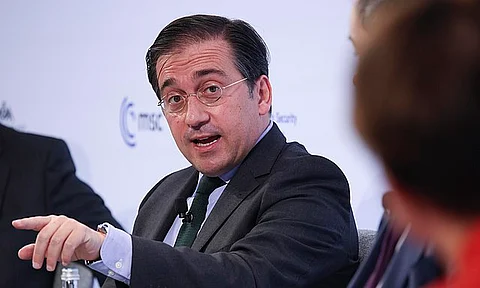

Spain has urged the international community to impose sanctions on Israel to end its military offensive in Gaza, citing a worsening humanitarian crisis marked by famine risks and restricted aid access.
Foreign Minister José Manuel Albares made the appeal ahead of a high-level Madrid summit on May 25, 2025, attended by 20 European and Arab nations, the Arab League, and the Organisation of Islamic Cooperation.
Albares emphasized the need for “massive, unobstructed” humanitarian aid, criticizing Israel for controlling aid distribution and deepening civilian suffering.
Humanitarian Crisis Reaches Breaking Point
A near-total Israeli blockade on Gaza for three months has led to severe shortages of food, water, and medicine. Despite Israeli Prime Minister Benjamin Netanyahu’s recent pledge to allow limited aid, UN agencies report only 100 trucks have entered since mid-May—far below the 500–600 daily trucks required. Aid groups dismiss the move as a “smokescreen,” accusing Israel of maintaining deliberate restrictions. Over 54,000 Palestinians, mostly women and children, have been killed since the war began in October 2023, according to Gaza’s Health Ministry.
EU Allies Shift Stance, Germany Backs Ceasefire
Once-reliable EU allies of Israel, including Spain, Ireland, and Norway, are escalating pressure. The EU announced a review of its trade agreement with Israel, its largest trading partner, while the UK, France, and Canada threatened sanctions over aid restrictions. Germany’s Deputy Foreign Minister Florian Hahn called the situation “unbearable,” urging an immediate ceasefire and diplomatic solutions.
Madrid Talks Aim to Revive Two-State Solution
The Madrid Group’s fifth meeting sought to build momentum for a UN conference on June 17, co-hosted by France and Saudi Arabia, to advance Palestinian statehood recognition. Albares stressed the need to “create momentum” for broader international recognition of Palestine, aligning with Spain, Ireland, and Norway’s 2024 decision to formally recognize Palestinian statehood. Previous attendees, including Egypt and Jordan, have long advocated for a two-state solution based on pre-1967 borders.